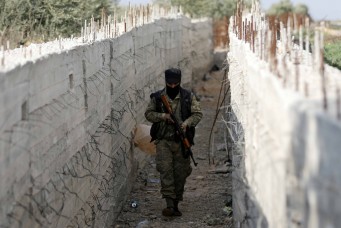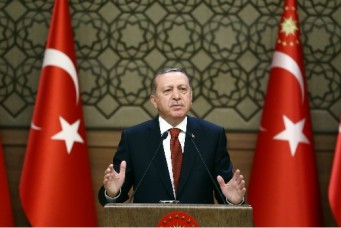Turkey’s Zero Problems with Neighbors Policy 2.0
Turkish-Syrian relations reached a new low after Syria downed a Turkish F-4 jet flying in international air space. Turkey changed its stance toward Syria dramatically, concluding that the incident was an intentional hostile attack and would be dealt with accordingly.
For years, the Turkish government of Prime Minister Recep Tayyip Erdoğan has practiced a “Zero Problems with Neighbors” foreign policy. But Turkish-Syrian relations reached a new low after Syria downed a Turkish F-4 jet flying in international air space. Turkey changed its stance toward Syria dramatically, concluding that the incident was an intentional hostile attack and would be dealt with accordingly.
Ankara interpreted Syria’s attack as a move to damage Turkey’s deterrence capacity, i.e. creating an image that despite having the second largest military force in NATO it is not able to project military power in retaliation to such an attack. For Ankara, this was a provocation to test Ankara’s limits and capacities. This perception, as it hurts Ankara’s standing and in the region, increases the possibility of a Turkish military response to the incident. Ankara feels obligated to repair its deterrence capacity by showing that it is indeed capable of projecting military power when it is necessary to do so. We have yet to see the full policy outcomes of this incident, yet clearly Turkey now sees Syria as a de facto enemy country and reserves its right to retaliate. The prospect of military measures marks a new phase in Turkish foreign policy. We might call it “Zero Problems with Neighbors 2.0.”
Despite some conflicting reports, the facts are clear: the downed Turkish jet was unarmed, flying alone and hit without any warning. Regardless of what may or may not have happened, Syria did not follow international procedures that include warning and scrambling before shooting down a plane. And that neglect will come at a price.
The first thing to note is the way in which Turkey dealt with the crisis. As opposed to the general tendency in Turkish politics to respond immediately, the government kept its cool and refrained from making any inflammatory public statements blaming Syria or any other countries before it got a full picture of the situation. For the Turkish public, this was even more shocking than the incident itself. Turkey and Greece came to the brink of war in 1996 when media reports inflated the disagreement between the two countries over the ownership of a pair of small, uninhabited islets.
It is clear that Turkish decision-makers this time followed a set procedure: collecting and gathering related classified and unclassified data and intelligence; taking a political decision; sharing the unclassified data with the Turkish public; informing domestic political actors and leaders; sharing the data with related international actors who have stakes in the incident i.e. UN, NATO, U.S., Russia, Iran, etc.; making the political decision public.
This marks a new era for the Turkish foreign policy decision-making process. Turkey was extremely careful to take a decision that may end up changing its threat perception about a country. Aware of the volatility in the region after the Arab Spring, Turkey figuratively revamped its own ‘Situation Room.’ This is one of the most important outcomes of the crisis, regardless of why it occurred or how it is resolved.
So, how will Erdoğan’s government respond? Part of the answer is hidden in the prime minister’s speech to Turkish lawmakers. Making references to common historical figures such as Kilij Arslan and Saladin, who defended Syria against the common enemies, Erdoğan indicated that, Turkey has no intention of threatening Syria in a way that could lead to the fragmentation of the country but rather would be the guarantor of a united Syria. This was a preemptive message for the criticism that may come from the Arab public if Turkey goes ahead with military retaliation. There were three other vital points in Erdoğan’s message: Turkey reserves the right to retaliate, the rules of engagement with Syria have changed; regime-change in Syria is a must.
Significantly, Erdoğan’s insistence on Turkey’s right to retaliate took precedence over the change of the rules of military engagement. This moves Turkey’s position one step further as it implies that a military response to the Syrian attack is Turkey’s right, and Turkey will not look for any further excuse to exercise this right. In other words, Ankara sees that it has ‘right to retaliate,’ born out of international law, and that the ‘time, place and method’ of retaliation will be determined solely by Turkey. It means that Ankara may exercise its right to retaliate without waiting for any further consultations with NATO–as that process is already done after NATO’s article 4 meeting–or without waiting for to any foreign partner to come in to help.
Erdoğan’s reference to changing the rules of engagement might be read as de facto declaration of war against Syria, which could become de jure at any moment. In his speech, Erdoğan said that Syrian helicopters strayed into Turkish airspace on five occasions in 2012, and yet none was shot down by Turkish forces. This will not be the case any longer, because the rules of engagement for military units operating along the country’s border with Syria have been changed. According to this new threat conception, this situation allows Turkish units to fire on any Syrian military units approaching the border. This aims to deter Syria from repeating its hostile act against Turkey in the future.
Finally, Erdoğan also said that Turkey will not live with the current Bashar Al-Assad regime because under his rule the country has become “an enemy state.” This means that Turkey will work with full force to overthrow the current leadership in Syria. Separating Syrian people from the regime, and targeting only the current leadership, Turkey will work with the opposition and any possible partner from the country even more aggressively. Until now, Turkey has been cautious about calls for arming the Syrian opposition, believing that risked political disintegration in the whole region by creating regional black spots. It preferred to offer non-lethal aid, and hosted Syrian opposition groups and the Free Syrian Army on Turkish soil. After Erdoğan’s speech, this posture may change, and Turkey may have a more aggressive stance as we witnessed in Libya when Turkish Special Forces trained Libyan rebels against Qaddafi.
The F-4 crisis, which Turkey believes began with an attack on its deterrence capacity, has changed the nature of Turkish-Syrian relations. With Ankara’s Zero Problems with Neighbors Policy, relations between the two countries were relatively warm for the past 14 years. Now, Turkey is moving a new era, where soft power alone may be insufficient to meet the challenges posed by its neighbors.
Nuh Yilmaz is a Lecturer at Marmara University in İstanbul. Previously he worked for Al Jazeera Turk and is the former Washington bureau chief for Turkish media organizations, including CNN Türk, ATV, 24, and STAR. He is a member of the board of the SETA Foundation for Political, Economic, and Social Research in Washington, and served as SETA Washington DC’s founding director from 2008 to 2011.



